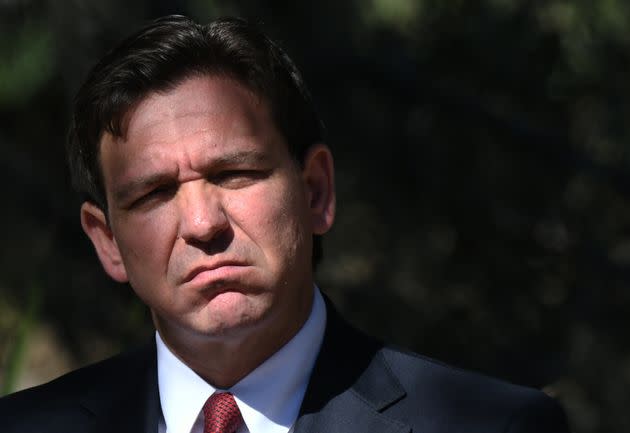DeSantis Signs Florida Bill Blocking Local Heat Safety Rules For Workers
- Oops!Something went wrong.Please try again later.
Failed presidential candidate Gov. Ron DeSantis (R) signed a bill late last week barring Florida localities from requiring employers to provide outdoor workers with access to water, rest and shade, outraging workplace safety advocates who say the new law will kill people.
Backed by the agricultural and construction industries, the controversial legislation is what’s known as a “preemption” law: It forbids cities and counties from pursuing their own ordinances on a particular subject, in this case protections from extreme heat.
The law effectively nullifies a proposal in Miami-Dade County that would require some employers to maintain a heat safety program and provide employees with water and shade on hot days. The county commission recently withdrew the proposal after the state legislation put its legality in doubt.
The preemption bill recently passed the Republican-controlled state House and Senate, along with a similar measure that prevents jurisdictions from requiring employers to pay livable wages on government-funded projects.
Unions and other progressive groups said blocking heat regulations would endanger farm and construction workers and anyone else who labors in one of the hottest states in the country.
“Someone is going to die as a result of this legislation,” Kim Smith, a telecommunications technician, told HuffPost last month.
Last year, Texas Republicans passed a similar preemption bill that blocked localities from implementing heat protections as well as other ordinances related to housing and labor. The legislation, known as Texas’ “death star bill,” appeared designed to thwart local laws in Austin and Dallas that guaranteed water breaks for workers.

Florida Republicans pushing for the preemption law said they wanted to avoid a “patchwork” of local regulations around the state related to heat safety, arguing the matter was better left to the federal Occupational Safety and Health Administration.
But OSHA does not yet have a heat-specific safety rule, and proposals to create a uniform, statewide standard in Florida have gone nowhere over the years because of a lack of Republican support.
More than 430 workers have died due to environmental heat exposure since 2011, according to OSHA. But relatively few jurisdictions have laws in place that require employers to provide water, shade and heat safety training. Just three — California, Oregon and Washington — mandate heat breaks for outdoor workers. Minnesota has heat standards for indoor workers, while Colorado does for farmworkers.
“Overheating is one of the most common and most serious dangers in the workplace,” Rep. Alma Adams (D-N.C.), who recently co-authored a federal bill ordering OSHA to regulate heat exposure, told HuffPost. “Is requiring a glass of water and some shade too much to ask?”
Climate change is making heat waves both more intense and more frequent, raising fears that a growing number of workers could die if governments don’t implement safety measures.
A farmworker in Miami-Dade County died last July during what would become the hottest month ever recorded. The man’s family told NBC South Florida that he’d recently suffered symptoms consistent with heat stress. A farmworker in the county told HuffPost last month that the foreman at the plant nursery where he works prohibited even 30-second breaks in the blazing sun since this is the busiest growing season for exotic flora.
The Biden administration is currently crafting a federal heat safety standard through OSHA, but federal rules take years to develop, often face litigation and can be undermined by subsequent administrations. Former President Donald Trump could simply drop pursuit of the rule if he defeats Biden in their expected rematch in November.
